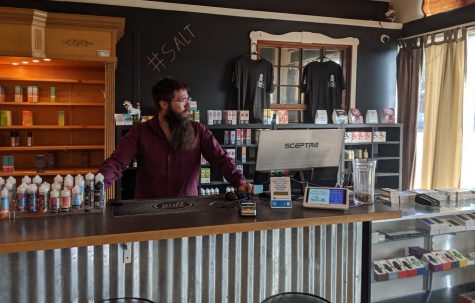Vape ban affects local businesses
October 9, 2019

“Hello, [Ruze] 509, we’re going out of business,” the cashier of Ellensburg’s specialty vape shop said answering the phone.
On Sept. 27, Washington state Gov. Jay Inslee announced an executive order banning the sale of flavored vaping products. This is in response to multiple investigations being undertaken by the Centers for Disease Control and Prevention (CDC) and U.S. Food and Drug Administration (FDA) as well as state and local health departments into multiple cases of severe lung disease which has been associated with the use of vapor products.
As of Oct. 1, the CDC states that there have been 1,080 cases of lung injury associated with e-cigarette and vaping products, and 18 deaths as a result of these symptoms. A controversy around the ban has erupted because most of the affected patients have reported a history of using vape cartridges containing illegal black-market THC vape fluid. Officials at the CDC is currently investigating the ingredients of these fluids with inconclusive results. They have, however, advised that those who have switched from cigarettes to vapor products not switch back.
In the meantime, Gov. Inslee’s proposed ban would prohibit the sale of all flavored vape products, legal and illegal, for 120 days before being potentially renewed.
“If I had a loved one, I would tell them right now you are just playing dice with your lungs if you are using these products,” Inslee said at a press conference following his announcement.
Even if the emergency ban isn’t renewed, it would be too late for vape shops across the state which would be forced to close their doors. CWU senior Noelle Tingey said that she feels there is an unfair discrepancy between how traditional tobacco products like cigarettes are treated versus vapor products.
“Cigarettes have been hurting people for years, giving people lung cancer,” Tingey said. “Vaping isn’t great but because it’s new, it’s getting hit much harder. If this is a problem now, they should have banned cigarettes.”
Brendan Killeen, 26-year-old manager of Ruze 509 Ellensburg, thinks that the discrepancy is due to financial connections between state governments and large tobacco companies like Philip Morris International.
In 1998, a lawsuit between 45 states and the tobacco industry resulted in the Master Settlement Agreement. In short, tobacco companies agreed to cease advertising campaigns which used cartoons or any other methods that could potentially appeal to children, and were made to pay over $206 billion over the following 25 years.
Up-front, the companies paid $12.74 billion. However, they also agreed to pay an amount proportionate to their yearly revenue in perpetuity. This can be seen as a punitive measure, so that if the companies continue making more revenue off of a dangerous product, they would still have to take a proportionate financial hit. However, this also means that the more money tobacco companies make, the more money is given to the state governments. This, Killeen believes, gives a financial incentive for state governments to ban vape products which are used as an alternative to smoking.
Gov. Inslee’s office hasn’t made mention of this potential connection as of the time of publication.
As for Killeen himself, he doesn’t know right now what will happen to him if Ruze 509 closes. He has worked for the shop in various forms for over 4 years and, while he said he has plenty of marketable skills, his area of expertise may vanish. Many may find themselves in the same situation. Across the state there are roughly 4,000 e-cigarette retailers, and thousands of people working at vape shops would lose their jobs if the ban is voted in.
“The worst part is the uncertainty,” Killeen said. “Even if they don’t vote on the ban, there are increased taxes in effect which will make things more expensive for customers and shops. I don’t know how long small shops like this one will be sustainable after the age increase in January. We’re all really demoralized because of it.”

